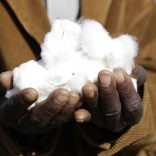Mozambique: Tobacco export revenue up 41% in 2024 to US$217.2 million
Mozambique: Severe drought spreading in south with consequences for agriculture – WFP

FILE PHOTO - For illustration purposes only. [File photo: Lusa]
A severe drought is spreading in southern Mozambique with consequences for agriculture, warned a report from the World Food Programme (WFP) with data from the Mozambican National Meteorological Institute (INAM).
The scenario contrasts with the situation in the centre and north of the country, where cyclones have devastated fields and the country’s already weak infrastructure, worsening poverty and humanitarian needs.
Water that causes damage in the north, is lacking in the south.
“Throughout February, severe drought conditions developed in the south of the country (from Maputo to Sofala and Manica, in the centre),” according to the document consulted by Lusa.
The report predicted that drought would prevail in March, which happened, with the country entering from April onwards what is naturally the driest season, with no relevant rains until October, and therefore no improvements are in sight.
The drought is expected to have “serious impacts on crop production in the provinces of Maputo, Gaza, Inhambane, Manica and Sofala,” the document warned.
Any downturn in agricultural activity in Mozambique has the potential to cause food insecurity as most of the population lives off what they grow.
This drought scenario had already started in 2021 and even threatened the north and centre of the country.
“The first part of the 2021/22 season” of the rainy season was the “driest or second driest period since 1981”, depending on the regions.
Only that while the rain, which fell from January onwards, allowed crops to recover in the uppermost parts of the country, or at least in areas that escaped the fury of Storm Ana and Cyclone Gombe, in the south this did not happen.
“The most likely scenario is that of severe impacts on maize production, leading to crop insufficiency and minimal production in many areas,” it concluded.
According to WFP data, 80 percent of Mozambique’s population, which amounts to 30 million people, cannot afford to buy food to have adequate nutrition. A total of 42 per cent of children are undernourished.
Food insecurity, that is, not knowing when the next meal will be, nor how to obtain it, affects 24% of Mozambican families chronically and 25% experience the situation at least once a year.












Leave a Reply
Be the First to Comment!
You must be logged in to post a comment.
You must be logged in to post a comment.